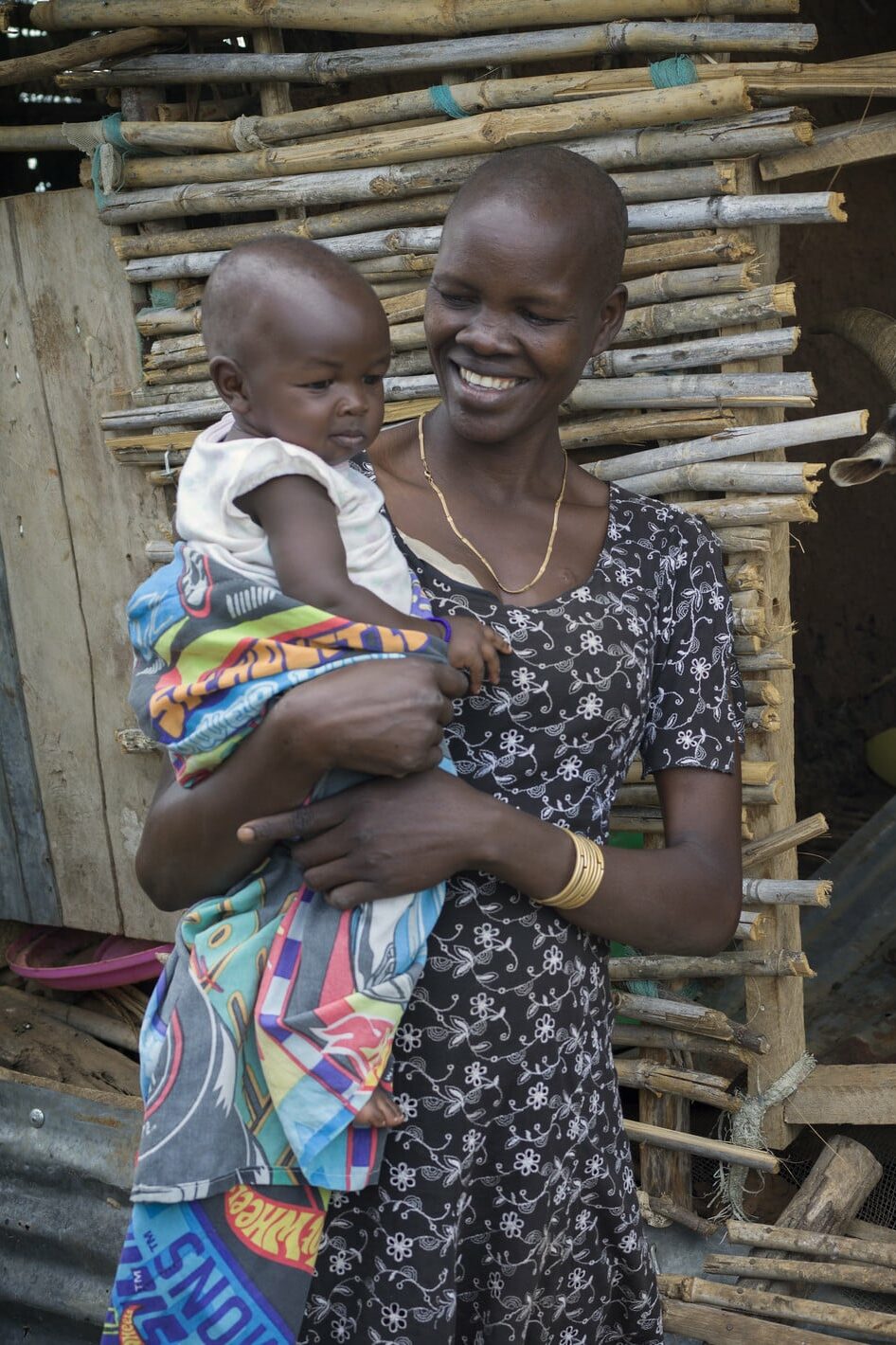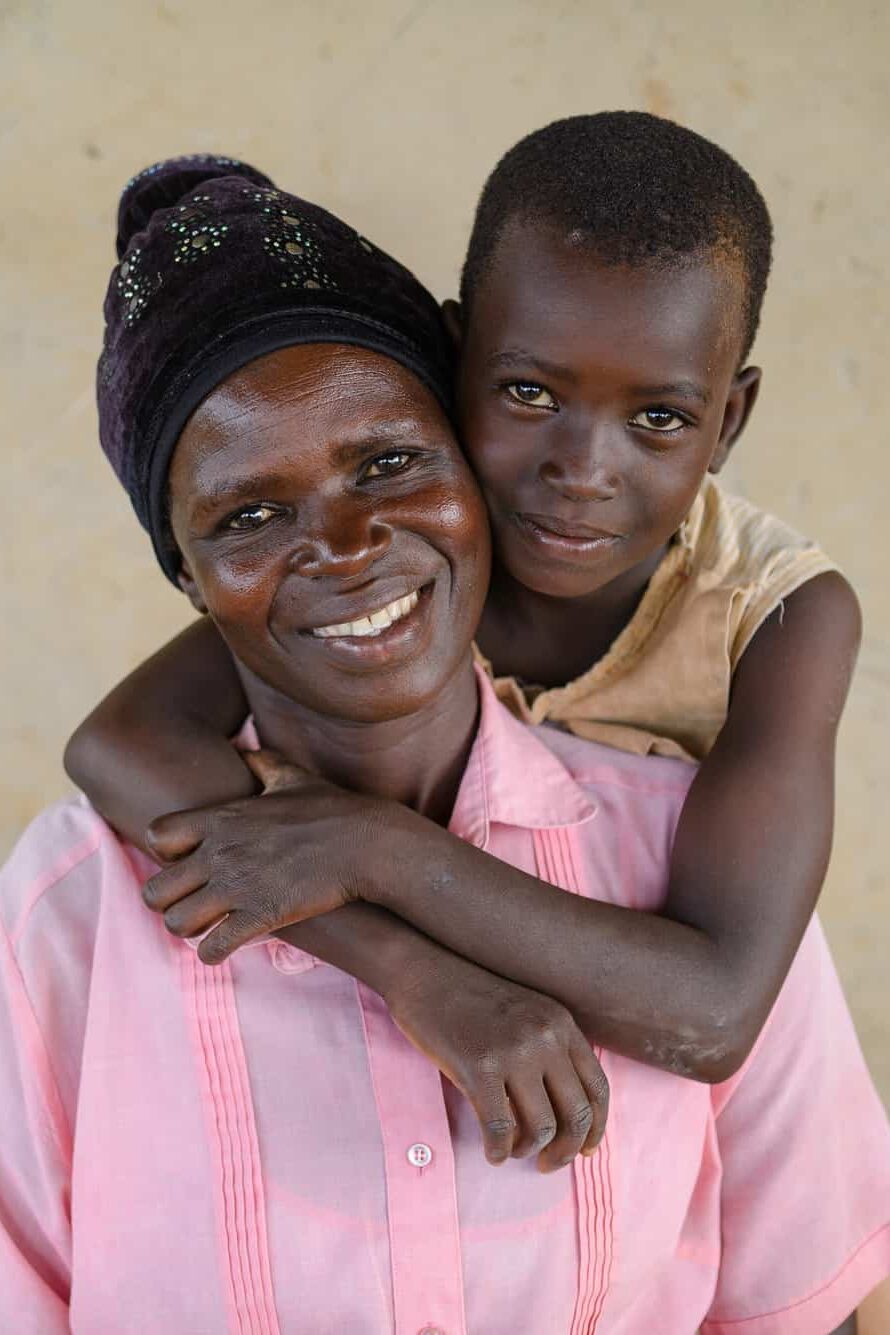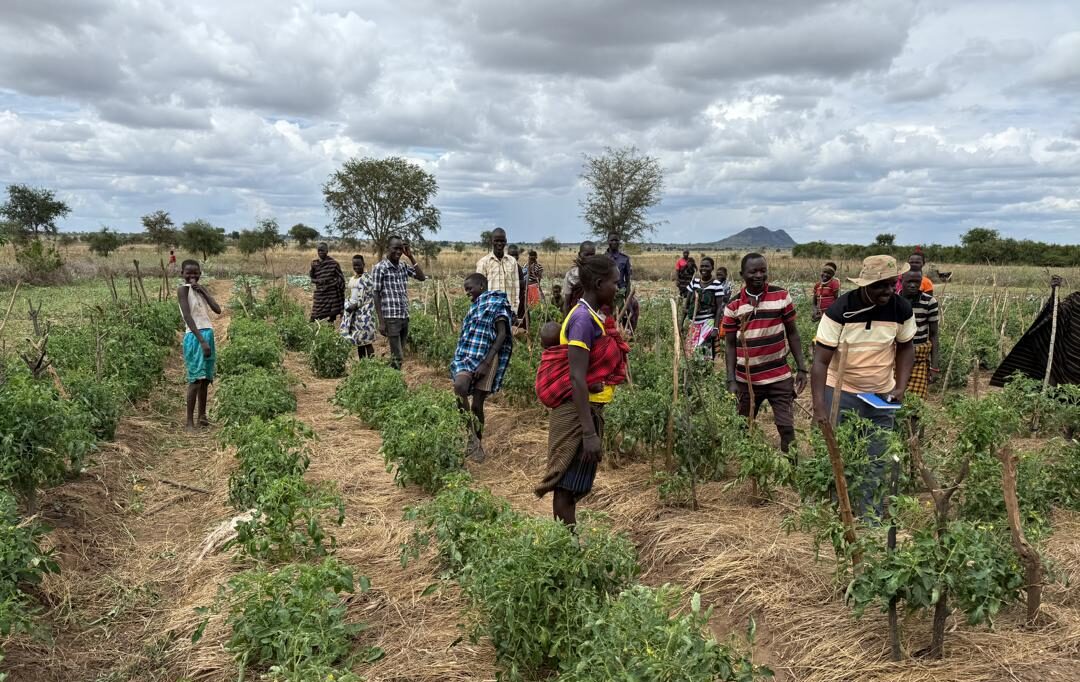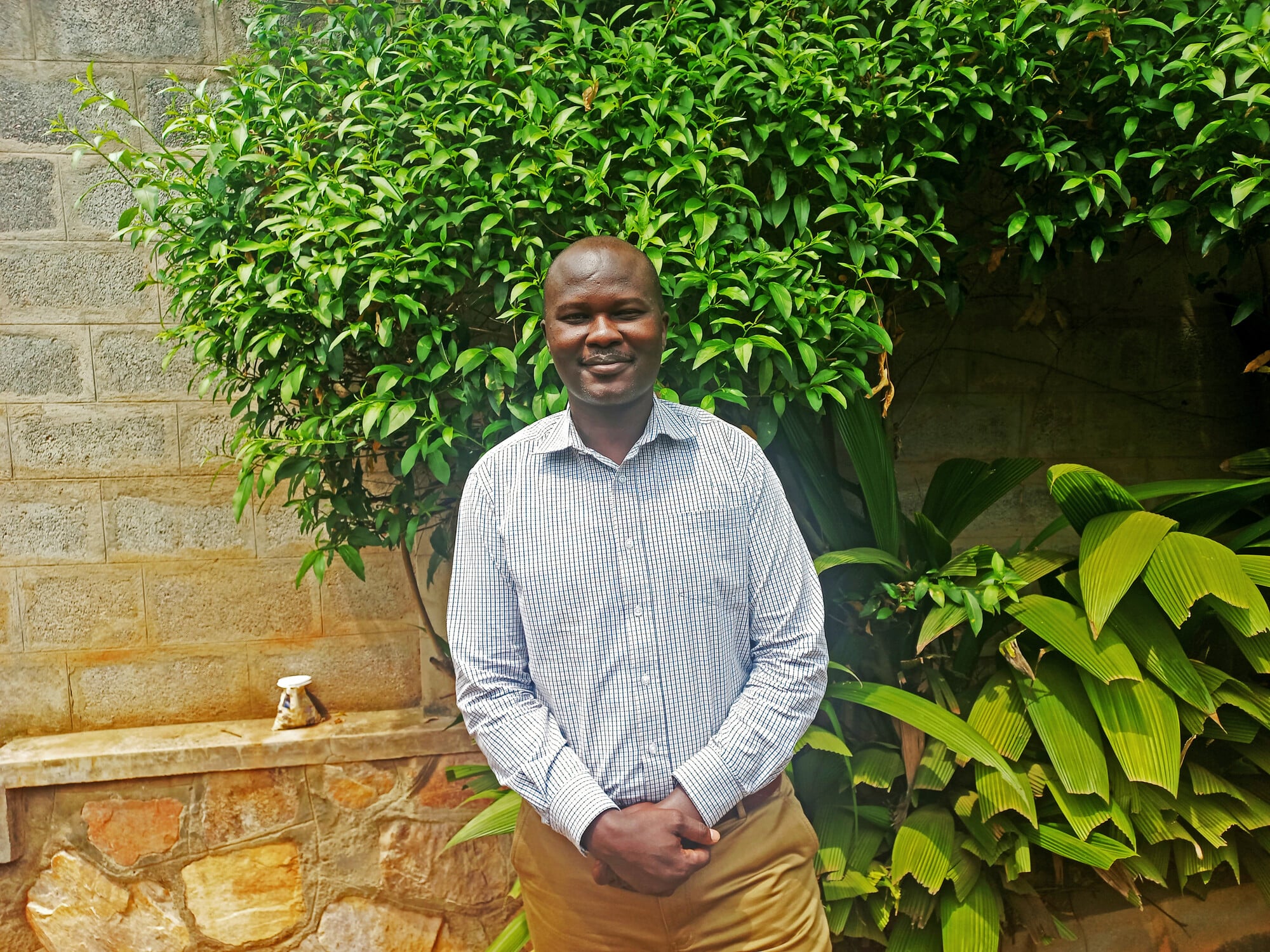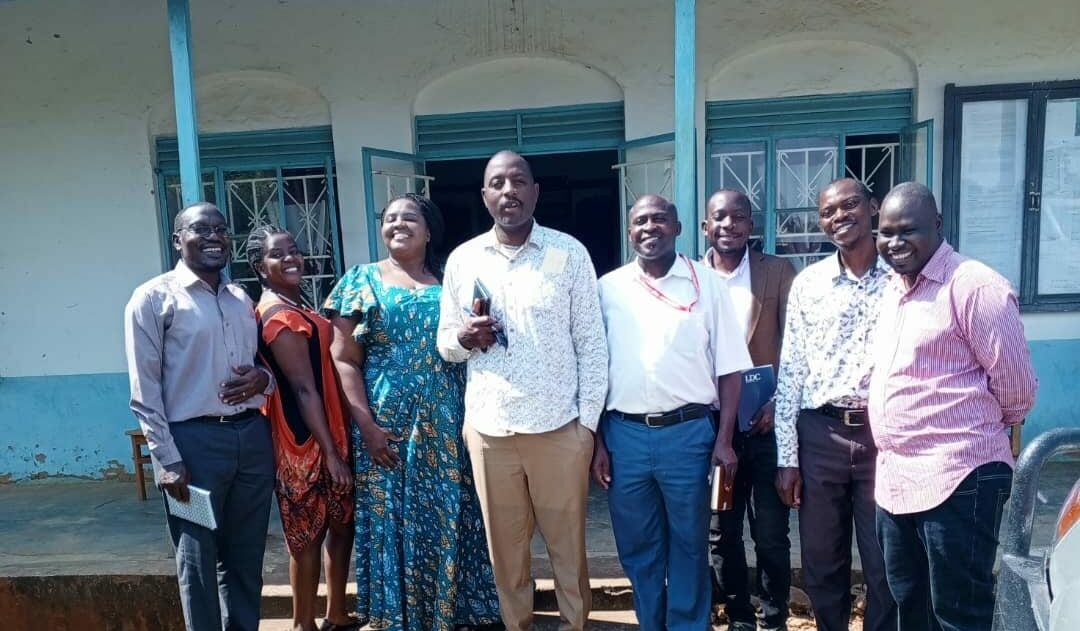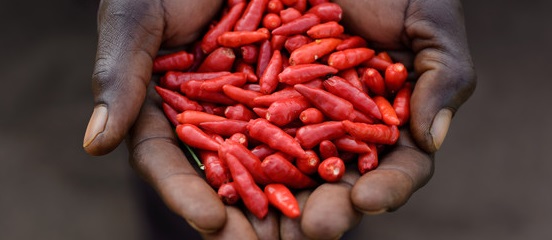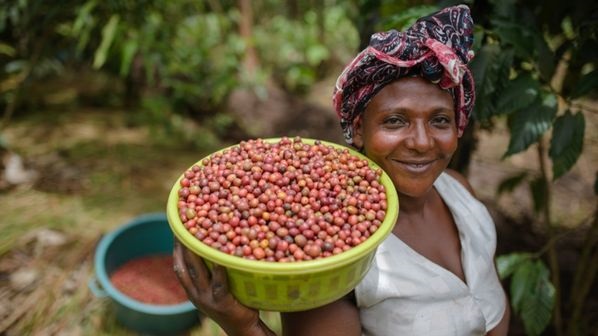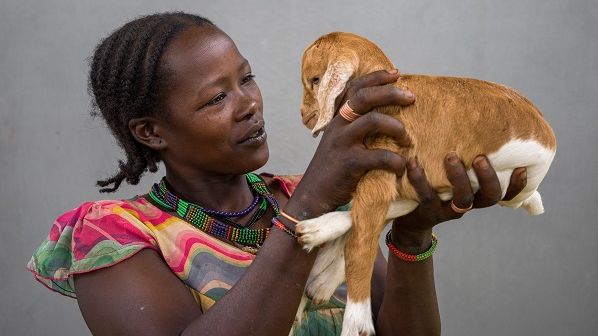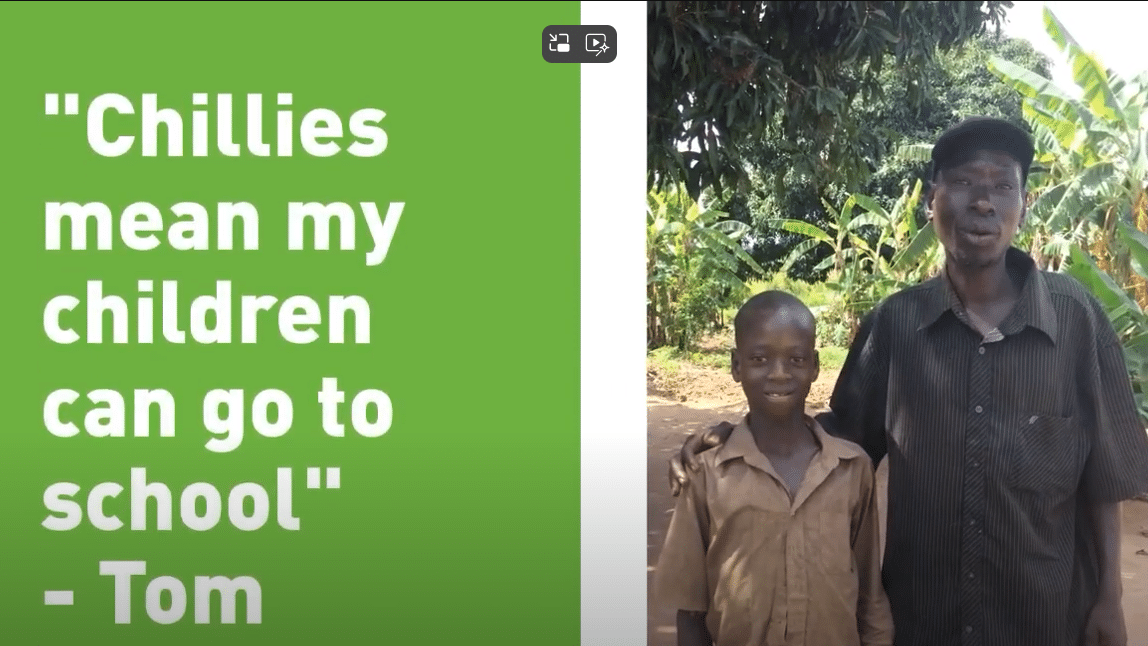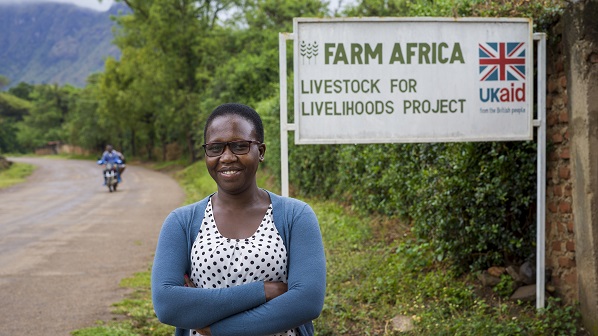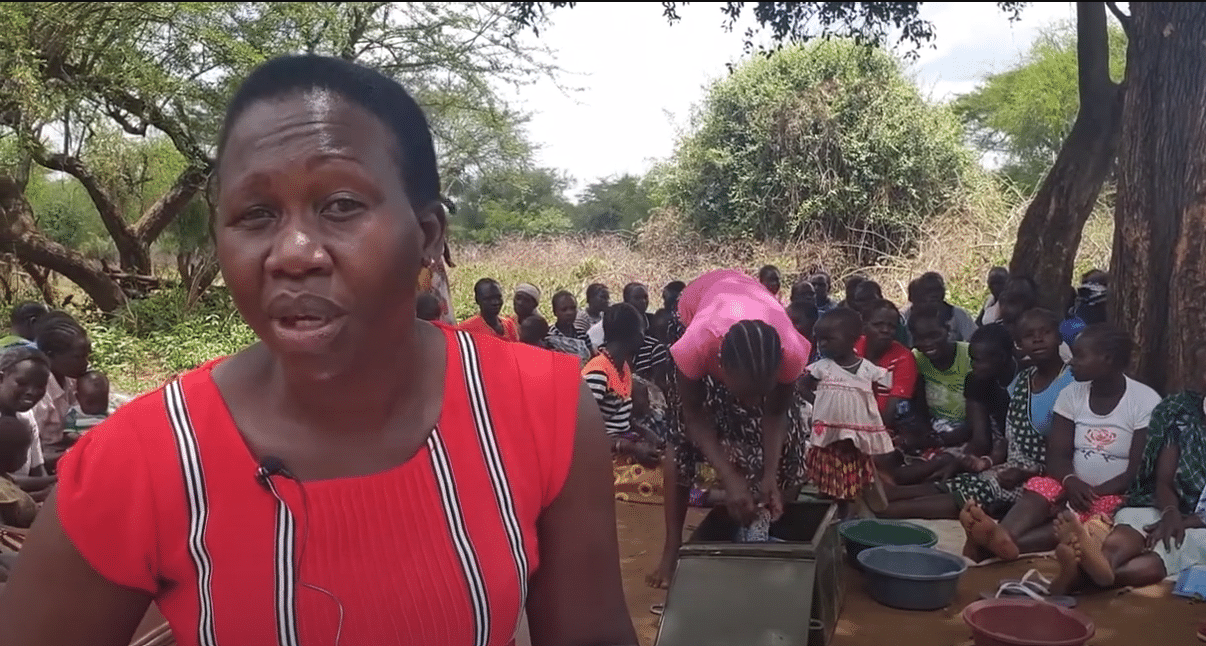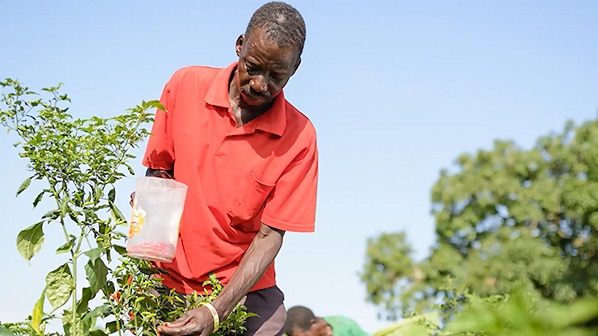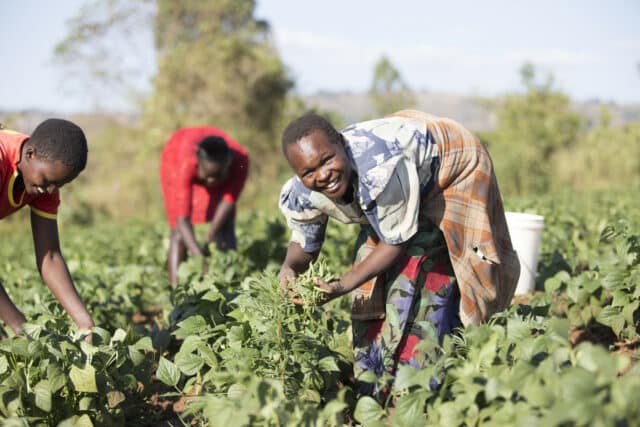Countries we work in
Uganda
Farm Africa helps rural communities in Uganda to increase their incomes and resilience to climate change by building environmentally friendly, inclusive and sustainable farming businesses.
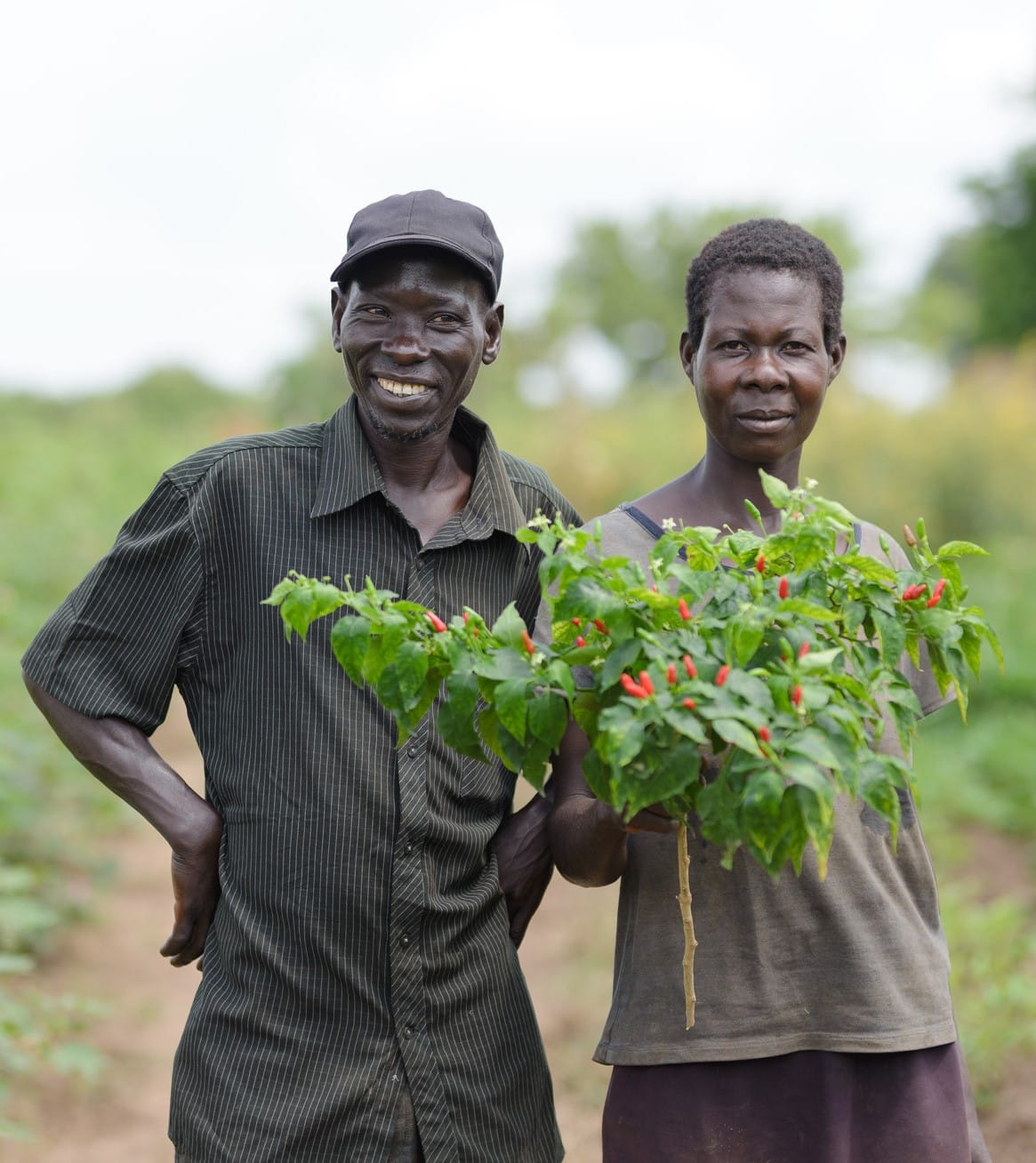
Uganda is a landlocked and fertile country with many lakes and rivers. About 74% of the population live in rural areas.
The economy is heavily reliant on agriculture, making up close to one quarter of Uganda’s economy. Uganda’s agricultural sector presents significant opportunities to reduce poverty.
Challenges
Despite Uganda’s good soil and favourable weather, there are many barriers preventing farmers making the most of the country’s growing economy.
Extreme weather events such as floods, landslides, and prolonged drought are becoming more frequent.
Many households depend on subsistence farming and are extremely vulnerable to external shocks and stresses, including those brought on by climate change and conflict.¹
Agricultural yields are also held back by farmers’ small plots of land, low access to training and credit, poor soil management techniques, and lack of quality seeds, fertilisers and pesticides.
When farmers do have a surplus straight after harvesting, prices are at their lowest and they struggle to make money at local food markets. This creates a vicious circle in which farmers have little incentive to raise production levels or invest in new techniques.
Uganda is among the poorest and least food secure countries in the world, with 30% of people living in poverty and 56% of the population moderately food-insecure.²
56%
of Uganda's population are moderately food-insecure.
Farm Africa in Uganda
Farm Africa has been operating in Uganda since 2003.
We help rural communities in Uganda find ways of earning a living that are suited to their natural environment, so they can improve their lives without damaging the natural resources they rely on.
“I am fully committed to guiding the Uganda team towards a brighter future of a resilient community, where people and environment thrive.”
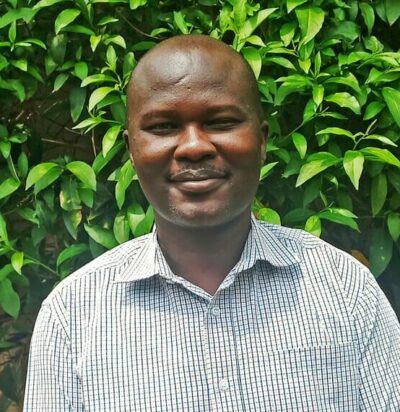
Samuel Arop
Uganda Country Representative, Farm Africa
We help a range of people, ranging from pastoralists in Karamoja to coffee growers in western Uganda, and horticulture and cereal producers in northern and eastern Uganda, build climate-resilient farming businesses by increasing their knowledge of good agricultural practices and boosting their access to farming inputs, finance and markets.
We also support rural communities to have more of a voice in shaping the policies that affect their lives.
Women and young people
Women and young people are disproportionately affected by poverty and climate change due to cultural dynamics that constrain their access to resources and opportunities.
Farm Africa supports female and young farmers in Uganda to gain access to knowledge and information on production; markets and finance; and productive resources such as land. We help them join cooperatives and participate more in decision-making in their households so they can have more say over the profits generated from their agricultural efforts.
We help give children the best start in life by supporting their parents to produce climate-resilient nutrient-dense foods and learn about the importance of dietary diversity to their families’ health.
An entrepreneurial approach
Farm Africa helps smallholder farmers in Uganda to build their entrepreneurial skills. We offer training in business planning, financial management, marketing and adding value to produce, whether that’s drying and packaging chillies or making cheese from goats’ milk.
By equipping farmers with business skills, we help ensure agricultural enterprises are run effectively and can weather shocks, so that farming families have the security of a reliable income.
With our support, farmers are building diversified livelihoods that provide stable sources of income, and developing foundational skills that enable them to participate in the market economy and become productive members of the society.
Our programmes in Uganda
Active
Youth empowerment project
Running since
2023
Country
Uganda
Target reach
500
Key focus areas
Boost productivity
Boost youth employment
Support businesses
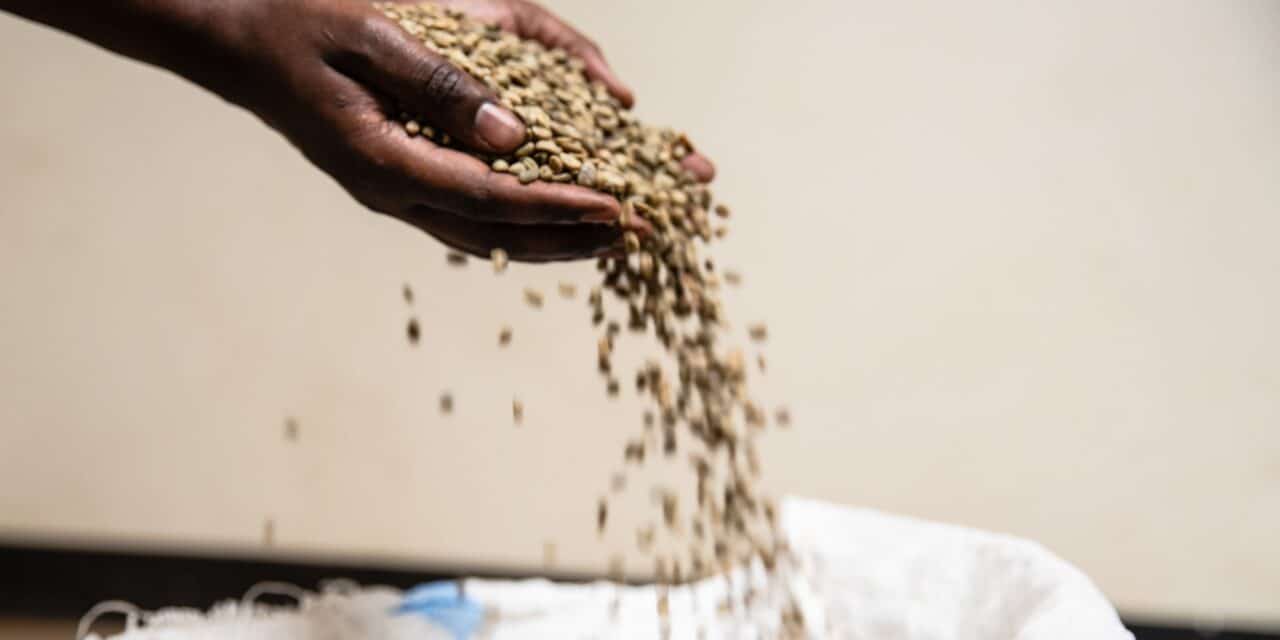
Youth empowerment project
Running since
2023
Country
Uganda
Target reach
500
Key focus areas
Boost productivity
Boost youth employment
Support businesses
Active
Youth empowerment project
The Youth empowerment project (YEP) aims to improve employment opportunities and income for 500 young people in southwestern Uganda by increasing productivity along the coffee, honey, poultry and horticulture value chains.
We’re fuelling productivity by setting up value addition and business incubation centres through Youth Innovation Hubs Africa to help young people launch business ventures along these value chains.
To ensure these young entrepreneurs receive the support they need to become self-sustaining, we’re also training 50 women and young people to become self-employed local business agents who can offer technical advice on selected enterprises, run training workshops and help facilitate access to supplies, land and technology.
Running since
2023
Country
Uganda
Target reach
500
Key focus areas
Boost productivity
Boost youth employment
Support businesses
Active
CASCADE
Running since
2024
Country
Uganda
Target reach
14,500
Key focus areas
Boost productivity
Empower women
Increase food security and nutrition
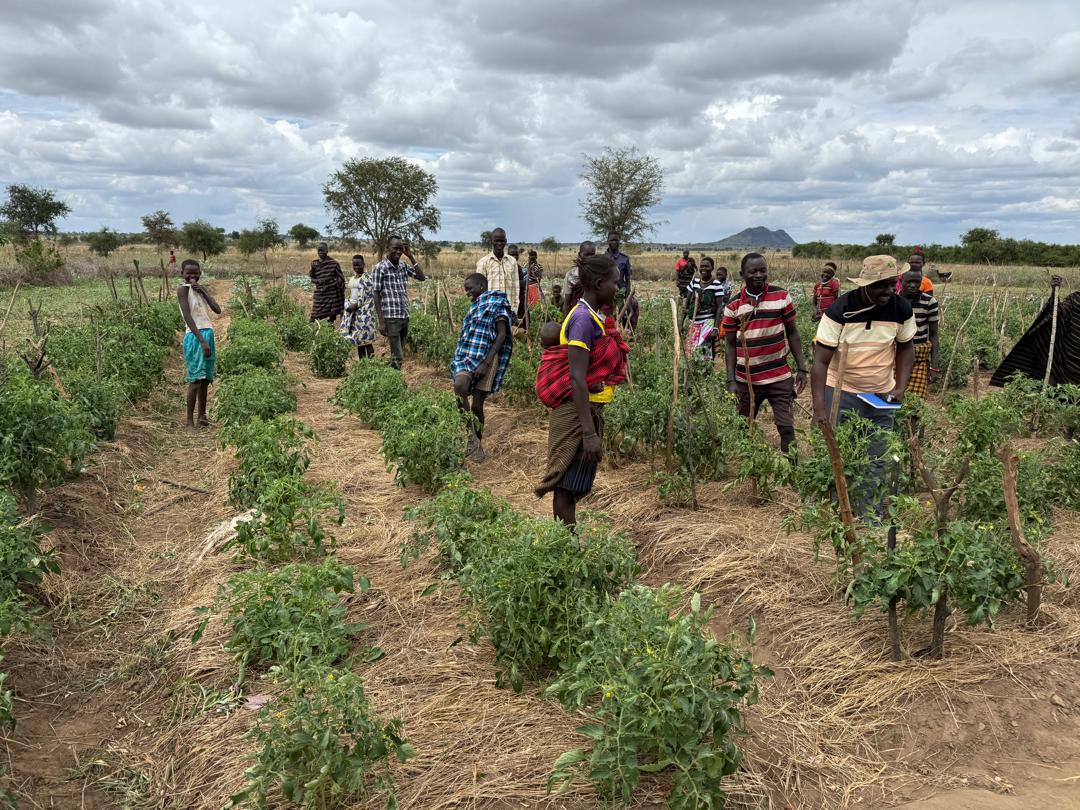
CASCADE
Running since
2024
Country
Uganda
Target reach
14,500
Key focus areas
Boost productivity
Empower women
Increase food security and nutrition
Active
CASCADE
With funding from the Dutch Government, Farm Africa is working in partnership with CARE’s CASCADE programme to put women in eastern Uganda in the driving seat of improving the diets of their young children and themselves, even in the face of climate shocks.
In Uganda’s Karamoja sub-region, poverty and chronic malnutrition is widespread, particularly among women and children. Most families eat a limited diet of cereal grains and wild leaves, and there is low awareness about the importance of a balanced diet. These rural communities rely heavily on natural resources, which leaves them vulnerable to frequent climate extremes.
The project supports rural women in four districts (Moroto, Napak, Abim and Kotido) to grow a range of nutritious foods, learn about healthy eating and overcome cultural barriers holding them back.
Running since
2024
Country
Uganda
Target reach
14,500
Key focus areas
Boost productivity
Empower women
Increase food security and nutrition
Active
Climate innovations for resilience in Karamoja (CLIRK)
Running since
2024
Country
Uganda
Target reach
150
Key focus areas
Act on climate change
Increase food security and nutrition
Increase incomes
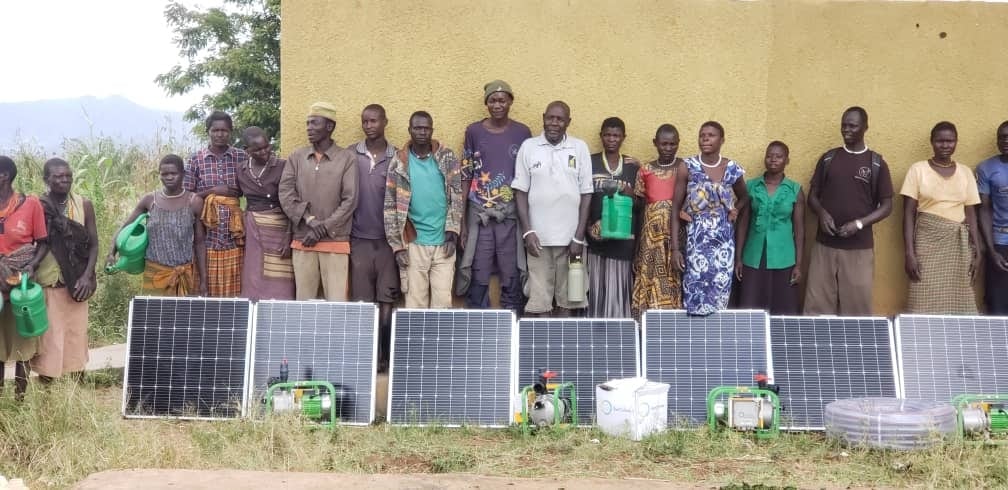
Climate innovations for resilience in Karamoja (CLIRK)
Running since
2024
Country
Uganda
Target reach
150
Key focus areas
Act on climate change
Increase food security and nutrition
Increase incomes
Active
Climate innovations for resilience in Karamoja (CLIRK)
In Uganda’s Karamoja region, Farm Africa is partnering with CARE International and local organisations to enhance climate resilience, food security and incomes of pastoralist communities, with a particular focus on women and young people. The project is transforming valley dam landscapes into sustainable, productive farmland for pastoralists, addressing the region’s critical water retention and agricultural needs amidst rising climate extremes.
The project supports groups of farmers, each guided by a trained Village Based-Advisor (VBA), in climate-smart agriculture, vegetable production and post-harvest handling of their crops. Demonstration gardens are established to grow high-value vegetables and leafy greens and show irrigation innovations that maximise water retention and access to water. Farmers also receive solar-powered irrigation kits, treadle pumps and seeds. As a result, farmers are now growing and eating a diverse range of crops year-round, improving their food security, incomes and nutrition.
As part of the project, farmers are linked to agro-input providers who supply high-quality seeds and agrochemicals, and are connected to buyers for their produce. This enables them to sell vegetables to neighbouring and local markets, restaurants and hotels. With more income, farmers can now buy more healthy food to add to their families’ diets.
Running since
2024
Country
Uganda
Target reach
150
Key focus areas
Act on climate change
Increase food security and nutrition
Increase incomes
Watch
Resources
Country
Uganda
Key focus areas
Boost productivity
Connect farmers to markets
Empower women
Women’s economic empowerment in the coffee value chain in Kanungu district, Uganda
In September 2019, Farm Africa launched a project in Kanungu district aimed at empowering women in the coffee value chain. The project worked with communities to increase the incomes of 2,640 women coffee producers, strengthen their household decision-making power and increase access to resources, enhance the capacity of CGCs to ensure women can leverage market opportunities while also engaging local stakeholders to recognise and reward women’s participation within the coffee value chain.
Download (5.91mb)
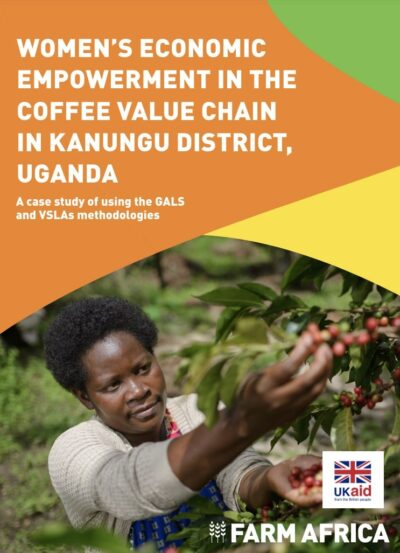
Country
Uganda
Key focus areas
Boost productivity
Connect farmers to markets
Empower women
Country
Uganda
Key focus areas
Connect farmers to markets
Increase access to finance
Support businesses
Commercialising chilli production: Project learning
An overview of the key learnings gained from Farm Africa’s chilli project in Lira, northern Uganda.
Download (4.89mb)
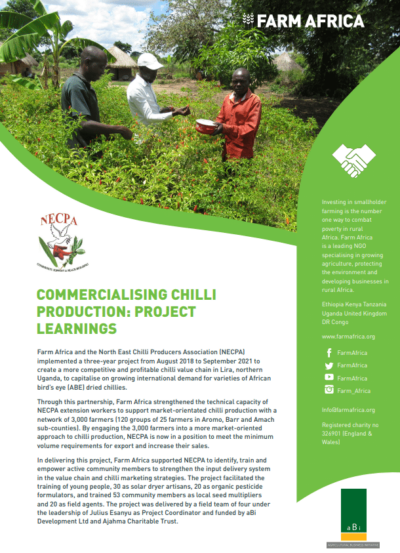
Country
Uganda
Key focus areas
Connect farmers to markets
Increase access to finance
Support businesses
Country
Ethiopia
Key focus areas
Empower women
Increase food security and nutrition
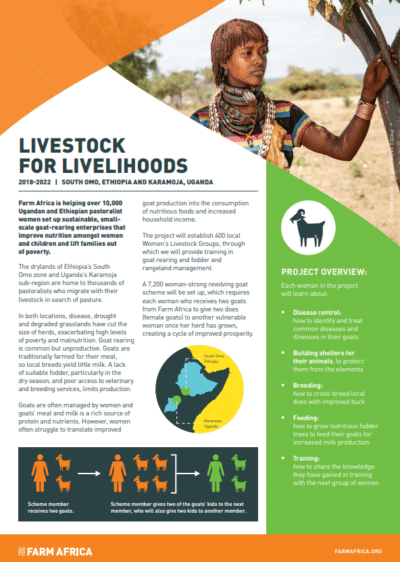
Country
Ethiopia
Key focus areas
Empower women
Increase food security and nutrition
Country
Uganda
Key focus areas
Empower women
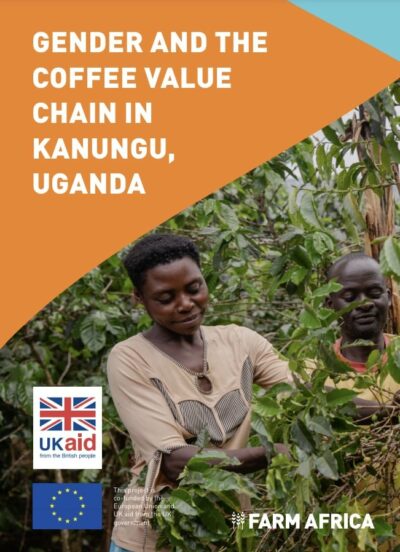
Country
Uganda
Key focus areas
Empower women
Country
Ethiopia
Key focus areas
Empower women
Increase incomes
Revolving Goat Fund
Farm Africa’s Livestock for Livelihoods project helped Ugandan and Ethiopian pastoralist women set up sustainable, small-scale goat-rearing enterprises. This four-page booklet outlines how Farm Africa set up a revolving goat scheme across South Omo and Karamoja. The scheme required each woman who received does (female goats) from Farm Africa to give does to another vulnerable woman once her herd had grown, creating a cycle of improved prosperity.
Download (799.73kb)
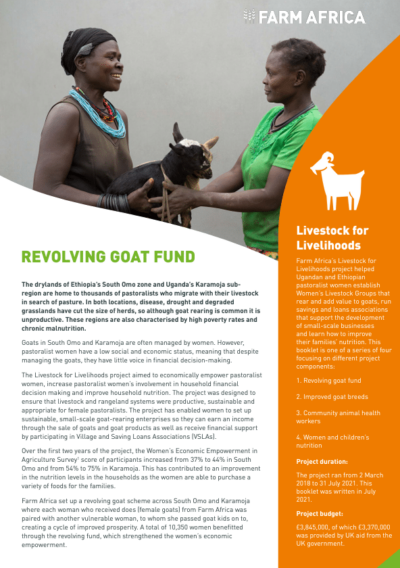
Country
Ethiopia
Key focus areas
Empower women
Increase incomes
Country
Uganda
Key focus areas
Connect farmers to markets
Increase access to finance
Support businesses
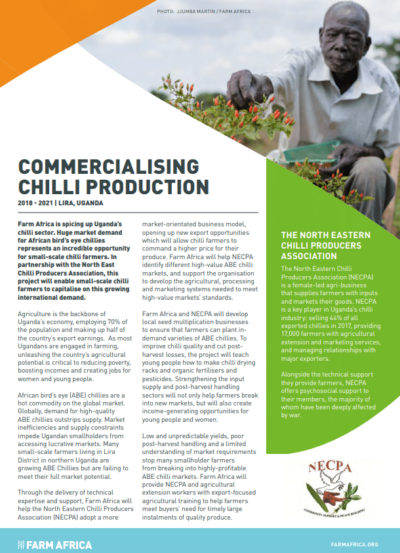
Country
Uganda
Key focus areas
Connect farmers to markets
Increase access to finance
Support businesses
Country
Uganda
Key focus areas
Protect ecosystems
Strengthen food systems
Sustainable coffee production in Kanungu, Uganda
Factsheet on sustainable coffee production in Kanungu, Uganda, which explores how by working in a sustainable way, smallholder farmers can generate good yields of high-quality coffee that fetch a good price for many generations to come. Farm Africa’s coffee project in Kanungu was co-funded by the European Union.
Download (2mb)

Country
Uganda
Key focus areas
Protect ecosystems
Strengthen food systems
Country
Uganda
Key focus areas
Empower women
Increase food security and nutrition
Women and children’s nutrition in Uganda
Farm Africa’s Livestock for Livelihoods project helped Ugandan and Ethiopian pastoralist women set up sustainable, small-scale goat-rearing enterprises. This four-page booklet outlines how the project helped to improve the nutrition of women and young children in Karamoja, Uganda. Wasting in young children (0-59 months), infant and young child minimum dietary (IYCF-MDD) score, and Minimum Dietary Diversity for women (MDD-W) all showed positive trends and improvement during the project life cycle.
Download (1.19mb)
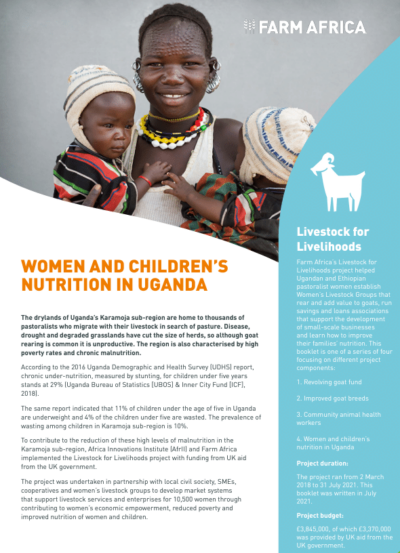
Country
Uganda
Key focus areas
Empower women
Increase food security and nutrition
Country
Ethiopia
Key focus areas
Empower women
Increase food security and nutrition
Increase incomes
Community Animal Health Workers
Farm Africa’s Livestock for Livelihoods project helped Ugandan and Ethiopian pastoralist women set up sustainable, small-scale goat-rearing enterprises. This four-page booklet outlines how the project created and strengthened a network of community animal health workers (CAHWs) linked to agro-input dealers to enhance pastoralists’ access to quality animal health services.
Download (860.17kb)
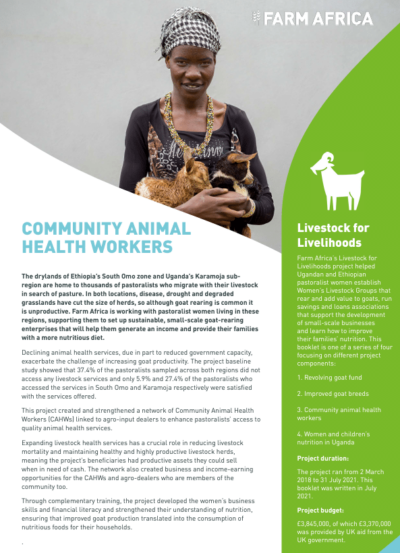
Country
Ethiopia
Key focus areas
Empower women
Increase food security and nutrition
Increase incomes
Country
Ethiopia
Key focus areas
Increase food security and nutrition
Improved goat breeds
Farm Africa’s Livestock for Livelihoods project helped Ugandan and Ethiopian pastoralist women set up sustainable, small-scale goat-rearing enterprises. This four-page booklet outlines how the project created and strengthened a network of community animal health workers (CAHWs) linked to agro-input dealers to enhance pastoralists’ access to quality animal health services.
Download (847.17kb)
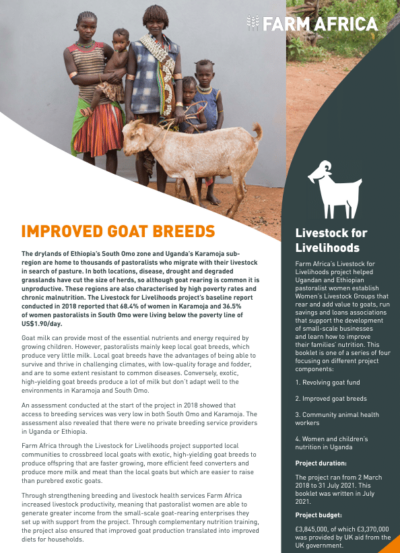
Country
Ethiopia
Key focus areas
Increase food security and nutrition
Country
Ethiopia
Key focus areas
Empower women
Increase food security and nutrition
Impact of increased women’s incomes on nutrition
Farm Africa’s Livestock for Livelihoods project helped Ugandan and Ethiopian pastoralist women set up sustainable, small-scale goat-rearing enterprises. This booklet highlights how Farm Africa improved 10,000 women’s access to credit facilities and incomes by adding value to livestock products and opening up improved opportunities for sales.
Download (2.29mb)
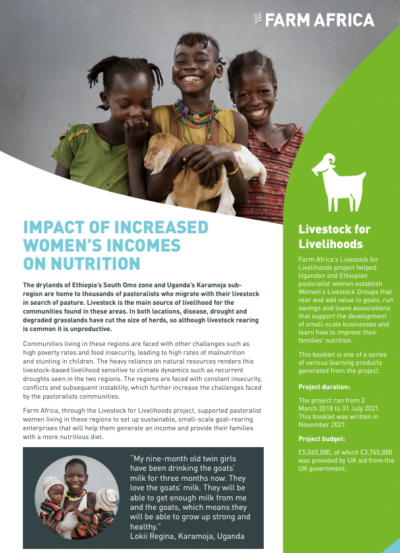
Country
Ethiopia
Key focus areas
Empower women
Increase food security and nutrition
Country
Ethiopia
Key focus areas
Empower women
Increase food security and nutrition
Increase incomes
Household socioeconomic status and women and children’s dietary diversity
Farm Africa’s Livestock for Livelihoods project helped Ugandan and Ethiopian pastoralist women set up sustainable, small-scale goat-rearing enterprises. This booklet examines the factors that improve dietary diversity in women and children, including women’s economic empowerment, production of food crops and the size of livestock herds.
Download (7.2mb)
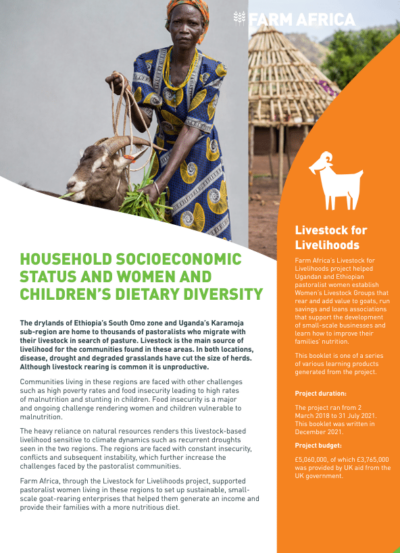
Country
Ethiopia
Key focus areas
Empower women
Increase food security and nutrition
Increase incomes
